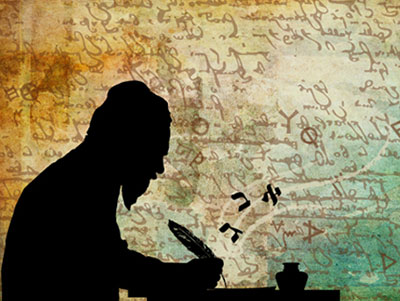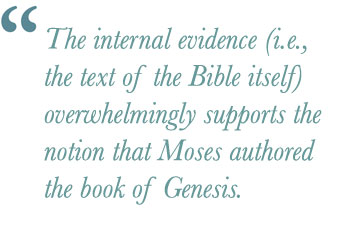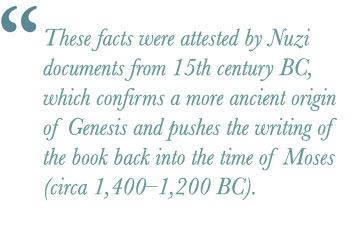
Jewish and Christian tradition has consistently attributed the writing of the book of Genesis to Moses. In addition, the New Testament authors, the early church fathers, as well as Jesus himself, all credited Moses with writing the Pentateuch.1 Thus, there seems to be abundant witness to the authorship of Moses. However, many others would disagree that Moses even existed, let alone authored these books. So, the question becomes: “Is there sufficient reason to believe that Moses could have written the book of Genesis?” This question will be explored below.
Internal Evidence and the Witness of Early Church Fathers
The internal evidence (i.e., the text of the Bible itself) overwhelmingly supports the notion that Moses authored the book of Genesis. Although some people shy away from using the Bible as a reference, this is ill-advised. The Bible represents a primary source document, which has been shown to be generally reliable as regards the authenticity of its historical claims (see TIBP article: “Is the Old Testament Historically Reliable?”). In the paragraphs below, the author will examine the internal and external evidence for Mosaic authorship.
First, the man called Moses possessed all the qualifications necessary to write such a historical document. According to the book of Acts, “Moses was educated in all the wisdom of the Egyptians and was powerful in speech and action” (7:22). Professor of biblical and Judaic studies Randall Price (2017, 46) corroborates Moses’ qualifications: “Moses wrote from his unique perspective and experience as an educated Egyptian, Levitical priest, pastoralist, and national legislator.” Such a background in the academic disciplines of the Egyptian court, as well as serving as a lawmaker for the nation of Israel, would have surely equipped Moses with, among other things, the ability to write, and most likely in several languages.
Second, Moses is clearly declared to be the author of various parts of the first five books of the Bible.2 These sections include:

- The judgment of Amalek: “Then the Lord said to Moses, ‘Write this in a book as a memorial and recite it to Joshua…’” (Ex. 17:14).
- The Book of the Covenant: “Then the LORD said to Moses, ‘Write down these words, for in accordance with these words I have made a covenant with you and with Israel.’ So he was there with the LORD forty days and forty nights; he did not eat bread or drink water. And he wrote on the tablets the words of the covenant, the Ten Commandments” (Exodus 34:27, 28; see also Exodus 20:22–24:4).
- The stages of Israel’s journey out of bondage in Egypt: “Moses recorded their starting places according to their journeys by the command of the LORD, and these are their journeys according to their starting places…” (Num. 33:2ff).
- The “law”: “So Moses wrote this law and gave it to the priests, the sons of Levi who carried the ark of the covenant of the LORD, and to all the elders of Israel” (Deut. 31:9, cf. Deut. 5–10, 31:24).
- The “Song of Moses”: Then Moses spoke in the hearing of all the assembly of Israel the words of this song, until they were complete…” (Deut. 31:30, cf. 31:32–32:52).
Third, the New Testament authors—even Jesus himself—attributed all, or parts, of the first five books to Moses. Several New Testament authors affirmed that Moses wrote and handed down “the law” (Mk. 12:19; Lk. 2:22; Jn. 1:45, 8:5; Acts 13:39; 1 Cor. 9:9; 2 Cor. 3:15; Heb. 9:19). The apostle Paul attributed the book of Leviticus to Moses (Rom. 10:5, cf. Lev. 18:5). And Jesus encouraged his listeners to believe Moses: “If you believed Moses, you would believe me, for he wrote about me” (Jn. 5:46).
Fourth, besides the internal witness, the early church fathers consistently affirmed that Moses wrote the first five books of the Bible. Reformed theologian E. J. Young (as cited in McDowell 1999, 402) provided the following explanation:
The Apostolic Fathers and the subsequent Ante-Nicene Fathers, in so far as they expressed themselves on the subject, believed Moses to be the author of the Pentateuch…. Such instances of hostile criticism as are extant from this period come either from groups that were considered to be heretical or from the external pagan world.
Thus, the contention that Moses was not the author of the Pentateuch didn’t begin in earnest until the first two centuries AD, and even then, it was solely among heretical groups and those outside of the church. Of course, none of this proves that Moses authored Genesis. However, abundant Jewish and Christian tradition (i.e., external evidence), as well as internal biblical evidence, lends clear support to the Moses hypothesis.
Indirect Evidence
The late professor of Old Testament and Semitic languages, Gleason L. Archer (2007, 94–97), cited indirect grounds for affirming the Mosaic authorship of the Pentateuch. Archer pointed to several lines of evidence:

- The details in the account of Exodus indicate they were written by an eyewitness. For example, the author noted the exact number of palm trees and fountains at Elim (Exodus 15:27). The author also described in detail the appearance and taste of the manna (Num. 11:7–8), which was never mentioned again as an experience of Israel in future generations. This reinforces that the author was not writing this document centuries after the fact but had a first-person understanding of the narrative details.
- The author of the first two books of the Bible demonstrated a thorough knowledge of ancient Egypt. If Moses, indeed, grew up and received an education in Egypt—as affirmed in the Bible—he would be well-acquainted with the languages of the time and place, and his vocabulary would have shown a familiarity with all things Egypt. It is, indeed, true that the author of Genesis and Exodus displayed a thorough knowledge of Egyptian names, including the special title of honor bestowed on Joseph by Pharaoh (Zaphenathpá neah, “Nourisher of the land of the Living One”). He also used a greater number of Egyptian words than are used in the rest of the Old Testament; this would be expected of one who lived at that time and region.
- The author of the Pentateuch possessed a “foreign or extra-Palestinian viewpoint so far as Canaan is concerned.” References to weather and seasons in the text reflect Egyptian understandings, not Palestinian. The mention of plants and animals also reflects an Egyptian point of view and is never distinctly Palestinian. Even the animal skins that served as an outer covering of the tabernacle belonged to a marine mammal found in seas near Egypt and Sinai but well outside of Palestine. These examples show that the author’s viewpoint was distinctly Egyptian, as would have been expected in the case of Moses as author.
- The book of Genesis reflects archaic customs and language consistent with the second millennium BC. Many have tried to push the dating of Genesis forward into the final half of the first millennium BC, which would represent a period well after the time of Moses. However, the customs outlined in the book of Genesis through Deuteronomy—especially regarding legal procedures—were not continued into the first millennium BC but were found uniquely in the second millennium. Why is this important? Ancient Near Eastern historian Kenneth Kitchen (2006, 295) provided the obvious answer: “The particular and special form of covenant evidenced by Exodus-Leviticus and in Deuteronomy… could not possibly have been reinvented… by a runaway rabble of brick-making slaves under some uncouth leader no more educated than themselves.” According to Kitchen (Ibid.), “No Hebrew there [i.e., in captivity] could know of, or would care about, such high-level diplomatic abstractions.” Further, the Nuzi archives dating from the 15th–13th century BC, independently reinforce the fact that the covenant forms in the Pentateuch support an early date of the writing of the first five books of the Bible (Holden & Geisler 2013, 85). All of this confirms a more ancient origin of Genesis and pushes the writing of the book back into the time of Moses (c. 1,400–1,200 BC).
No matter what name you want to ascribe to the author of the Pentateuch (he’s either Moses or his doppelgänger), he must have been well-educated and literate, an eyewitness of the historical events described, well-acquainted with the land, customs, and flora and fauna of Egypt, and knowledgable about the ancient contractual and covenantal language of the time. As Kitchen (2006, 295) summed it up:
In short, to explain what exists in our Hebrew documents we need a Hebrew leader who had had experience of life at the Egyptian court… including knowledge of treaty-type documents and their format, as well as of traditional Semitic legal/social usage more familiar to his own folk. In other words, somebody distressingly like that old “hero” of biblical tradition, Moses, is badly needed at this point, to make sense of the situation as we have it.
The Language Argument
Many believe that Genesis couldn’t have been written by Moses because there were no alphabetic languages in existence at that time and place. Therefore, they would argue that Moses could not have written the Pentateuch in a form that was easily accessible to the masses. While it is true that Hebrew was not existent during the time that Moses was purported to live (c. 1,400 BC), he, nevertheless, could have written the first version of the Pentateuch in any number of languages. No doubt, the training of Moses included Egyptian hieroglyphics and Sumero-Akkadian cuneiform. But neither of these languages would have been efficient for the recording of history on parchment or papyrus. And, although Moses could have used waxed or baked clay tablets as media, it took far too many pictographs or wedge markings to say the same thing as could be said in much less space with an alphabetic language. Regardless, it is quite clear that there were alphabetic languages in existence during the time of Moses. According to Kitchen (2006, 305):
We should consider a Moses or a Joshua writing on papyrus, skins, or even waxed tablets in alphabetic late Canaanite. During the two centuries that followed, circa 1200-1000 [B.C.], standard Hebrew evolved out of this form of Canaanite, probably being fully formed by [King] David’s time.
Thus, late Canaanite represented an alphabetic language likely understood by Moses, as well as by the Hebrew people. This language may have been used by him to write the Pentateuch. Others have suggested that Moses used an earlier script, perhaps proto-Sinaitic (Rohl 2015, 216–219). If Kitchen is correct, then the original version of the text was written in a pre-Hebrew script, that would have only later been translated into a more developed Hebrew language. Nevertheless, the existence and use of alphabetic writing during Moses’ time removes this argument against Moses’ authorship of the Pentateuch.
Ancient Sources Available to Moses
There were different sources available to Moses that would have helped him craft the biblical narrative. First of all, the keeping of written records was a common practice at the time of Moses (Ex. 17:14; Num. 21:14; Josh. 10:13b), especially in Egypt where writing in hieroglyphic and hieratic characters (i.e., abridged hieroglyphics used by priests) was widespread (Archer 2007, 100). There were also early forms of Canaanite, which were attested to be the first group of languages to use an alphabet (likely derived from a type of proto-Canaanite). Thus, it is likely that some written records were preserved from the earliest stages of history, which would have provided Moses with various historical writings as references.
Second, oral tradition3 was likely a primary means of preserving the earliest known history. It was a well-developed practice for the Jews as it was for most ancient peoples. According to Kitchen (2006, 370), oral and written traditions were often used separately or side by side, “in some cases initial oral transmission gave way to a written format.” Thus, Moses would have had plenty of oral—as well as written—source material for his biblical works.

Third, the Bible also indicates that God showed special favor to Moses by manifesting His presence directly, appearing face-to-face (Num. 12:6–8). This kind of personal manifestation is called a theophany. If one believes in the historical reality of these appearances (history/archaeology cannot prove such occurrences), then God may have used these occasions to provide a firsthand account of primeval history to Moses or allowed him to ask questions directly.
Therefore, in writing the narrative of Genesis, Moses would have used whatever information was at his disposal, including oral tradition, written tradition, and information provided through external manifestation (theophany), to record the bulk of Israel’s history and prehistory.
Conclusion
So, does all this mean that Moses wrote the first five books of the Bible? No. On the other hand, no other alternative proposals can rise to the level of absolute truth on this question. The author suggests that there is no overwhelmingly good reason to suppose that Moses couldn’t have written the Pentateuch. Though others have cited evidence to the contrary, there are still substantial reasons to attribute the authorship of Genesis to Moses. While we may never know with certainty who wrote the book of Genesis, the belief that Moses was the author is well-supported.
About the Author
David P. Diaz, Ed.D., is an independent researcher, retired college professor, and publisher of Things I Believe Project. His writings have spanned the gamut from peer-reviewed technical articles to his memoir, which won the 2006 American Book Award. Dr. Diaz holds a Bachelor’s and Master of Science degree from California Polytechnic State University, a Master of Arts in Philosophical Apologetics from Houston Christian University, and a Doctor of Education specializing in Computing and Information Technology from Nova Southeastern University. [back to top]
Bibliography
Archer, Gleason L. A Survey of Old Testament Introduction. Chicago, IL: Moody Press, 2007.
Holden, Joseph M. and Norm L. Geisler, The Popular Handbook of Archaeology and the Bible. Eugene, OR: Harvest House Publishers, 2013.
Kitchen, Kenneth A. On the Reliability of the Old Testament. Grand Rapids, MI: Eerdmans, 2006.
McDowell, Josh., The New Evidence That Demands a Verdict. Nashville, TN: Thomas Nelson, 1999.
Price, Richard, Zondervan Handbook of Biblical Archaeology: A Book by Book Guide to Archaeological Discoveries Related to the Bible. Grand Rapids, MI: Zondervan, 2017.
Rohl, David M. Exodus: Myth or History? St. Louis Park, MN: Thinking Man Media, 2015.
Footnotes
- The Pentateuch (Grk: “five”), also called the Torah (Heb: “law”), refers to the first five books of the Bible.
- The first five books of the Bible are Genesis, Exodus, Leviticus, Numbers, and Deuteronomy.
- Oral tradition is the practice of one generation repeating material by spoken word, which would then be memorized by the next generation and so on throughout history.
David,
Your article does review the internal evidence that supports the idea of Mosaic authorship. However it is worth noting that many of the arguments against said authorship are also from internal evidence. One example being Det 1:1 that says, “These are the words Moses spoke to all Israel in the wilderness east of the Jordan” (NIV). That is written from the viewpoint of west of the Jordan. A place Moses never was. As you most likely are aware of there are multiple verses similar to this example which don’t align with Mosaic authorship. There are plenty of scholarly resources that discuss these verses. My point is that the issue is complex and not nearly as neat and tidy as presented here. People wrestling with this issue are probably aware of the difficulties and need a more comprehensive look at the issue.
With much respect,
Darren
Hi Darren,
Thanks so much for taking the time to comment on my article. I understand that this is a complex topic however, there is only so much that can be covered in an article the length of mine. My thesis was to show that there are reasons to believe that Moses wrote the Pentateuch or, at very least, that there are no overwhelming reasons why he couldn’t have written it. Indeed, there are many scholarly resources that write about an opposite thesis, but given the length of my article, I could not address them. Best regards, David.